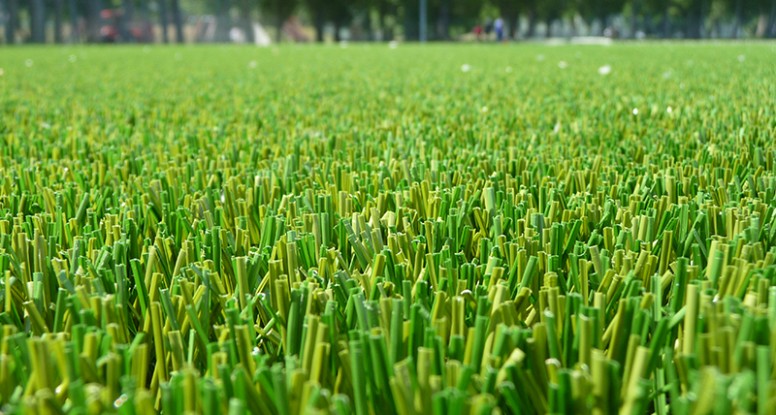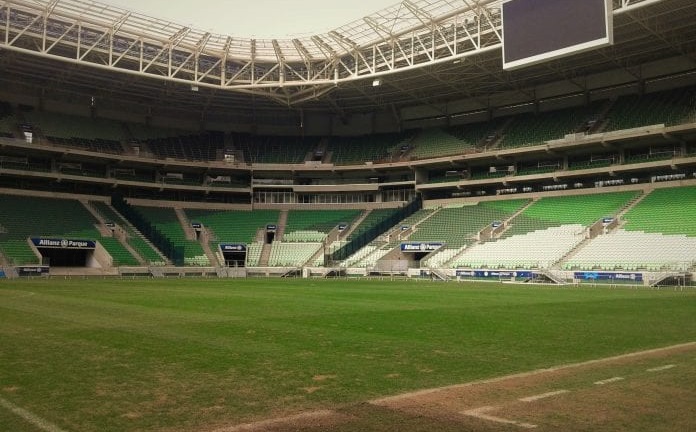There’s a high possibility that the grass of the Allianz Park will be fully synthetic by early 2020.
In mid-October, a delegation from Palmeiras and WTorre travelled to the Netherlands to meet with producers of artificial grass. Visits were made to factories, the Dutch national training centre, as well as stadiums using the technology. Palmeiras’ directors liked very much what they saw: the product presented is of a new generation, of a material not yet used in Brazil.

“For synthetic pitches, FIFA does an inspection once a year, with a week of testing. It’s much more demanding than for natural surfaces”, Palmeiras’ physiotherapy coordinator Jomar Ottoni explains. Athletico Paranaense’s stadium – with artificial grass since 2016 and the only such in use in the Brazilian first division – has coconut fibres to cushion falls, which taint the uniforms. The Allianz Parque’s will have sand-free rubber granules that soften impact without leaving marks. “Even the technology is different: it’s new, more resistant and more natural-looking,” adds Ottoni.
If all goes according to expectations, work on the new pitch will start already in December. And in addition to the Allianz Parque, Palmeiras intend to use the same type of surface on at least one of three training fields at the Football Academy. Total cost is estimated at approximately US$ 2 million, split between the parties.
Fewer muscle injuries
The use of artificial grass at the Allianz Parque has been studied since the inauguration, five years ago. Due to its shape, the stadium suffers from low solar incidence and the pitch has never been perfect. In addition, the large number of shows negatively affects maintenance.
 The change will be beneficial to players, as the number of muscle injuries is likely to decrease. On the other hand, tendons and ankles will be under more stress. “The artificial surface provokes a change in playing style, the coach needs to address this. Also, tendons and ankles suffer more due to impact absorption. On a synthetic pitch, the energy exchange is greater because you push the surface when accelerating, when jumping, and the pitch gives everything back to you. On grass, there is absorption of energy. Injury prevention and specialized training is key”, Ottoni concludes.
The change will be beneficial to players, as the number of muscle injuries is likely to decrease. On the other hand, tendons and ankles will be under more stress. “The artificial surface provokes a change in playing style, the coach needs to address this. Also, tendons and ankles suffer more due to impact absorption. On a synthetic pitch, the energy exchange is greater because you push the surface when accelerating, when jumping, and the pitch gives everything back to you. On grass, there is absorption of energy. Injury prevention and specialized training is key”, Ottoni concludes.
The possibility of artificial grass at the Allianz Parque is already generating expectations among athletes. “Contrary to what people think, artificial grass is very good to play on because there are no holes or irregularities. It’s perfect for passing play. With adaptation, it will be all right” says Palmeiras keeper Weverton, former Athletico. Raphael Veiga, another former Athletico player, agrees. “All players like a good pitch. I adapted very well to that grass. If Palmeiras opt for it, I will like it”.
Increased revenues
With the artificial pitch, the Allianz Parque will be able to generate additional revenues, increasing the number of shows without stripping Palmeiras of their stadium: a show can be hosted on Friday night and a match played on Saturday afternoon.
Fingers crossed. We’ve suffered enough already with inferior pitches and home games away from home.
Scoppia che la vittoria è nostra!


To be very honest this is something I don’t care much. I just hope the team can adapt and play well. Cheers!!!
I believe it will not only adapt well but improve the team’s performance. Cheers!
2 million dollars for synthetic pitches or do you mean the new hybrid pitch?
3G Artificial pitches aren’t really good for football